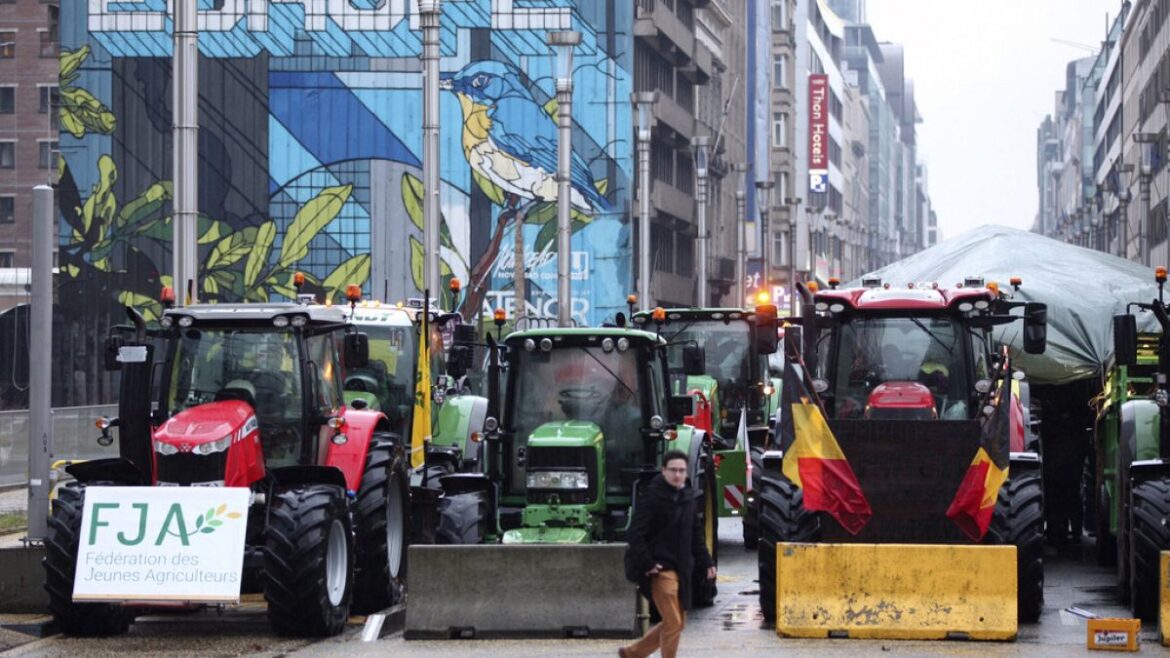Faced with the anger of European farmers, the Commission presented on Friday a project to reduce administrative and environmental constraints linked to the Common Agricultural Policy. NGOs are up in arms.
A few months before the European elections, and after an unprecedented movement of anger from the agricultural world, the European Commission unveiled on Friday its plan to drastically reduce the administrative and environmental constraints imposed on farmers as part of the greening of the Common Agricultural Policy (CAP). ).
For Ursula von der Leyen, the President of the European Commission, it is a question of sending “a clear message that Agricultural Policy adapts to changing realities while remaining focused on the essential priority of protecting the environment and adapting to climate change.”
The Commission is proposing a targeted review of certain conditions in the CAP Strategic Plans Regulation in order to “reduce the burden of controls on EU farmers and to offer them greater flexibility to comply with certain environmental conditions.
Member States will therefore have greater flexibility in the application of certain standards.
This plan must now be negotiated by MEPs and member states (Council of the EU) with a view to being adopted before the dissolution of the European Parliament ahead of the European elections (7-9 June).
Here are the Commission’s main proposals.
The end of fallows, under conditions
The Commission proposes that Member States can “exempt certain crops, certain soil types or certain agricultural systems from compliance with requirements relating to tillage, soil cover and crop rotation/diversification”(fallow land, editor’s note).
Thus, “targeted exemptions” will be granted “aimed at allowing plowing in order to restore permanent grasslands on Natura 2000 sites in the event of damage caused by predators or invasive species could also be possible”.
However, it will not be a question of signing a blank check. Exemptions “should be limited in terms of surface area and should only be established when they prove necessary to resolve specific problems”. It is moreover the Commission which will validate the requested modifications “to maintain consistency with the general environmental objectives of the plans”.
Moreover, in case of extreme weather conditionsStates will also be able to introduce temporary exemptions.
Finally, the Commission proposes “to exempt small farms of less than 10 hectares from controls and sanctions linked to compliance with cross-compliance requirements” knowing that small farmers represent 65% of CAP beneficiaries.
The question of farmers’ income
The main object of farmers’ demands in recent months, the question of farmers’ income is also addressed in the Commission’s plan which recalls, in the preamble, that “Strengthening the position of farmers in the food supply chain is one of the main objectives of the CAP__” . But to recognize that “to guarantee greater fairness and protect farmers against unfair commercial practices” (…) _“__There is still a lot to do” (…) “_in the short and medium term.
The European executive first proposes the launch, this summer, ofa****observatory of production costs, margins and commercial practices in the agri-food supply chain. It will be composed of representatives from all sectors of the food supply chain and representatives from Member States and the Commission and “will strengthen the transparency of costs and margins in the chain by making data public and exchanging information, with a view to strengthening trust between stakeholders and establishing a common diagnosis of the situation.“
Concerning the CMO (common organization of the markets in agricultural products), the Commission is proposing “options for targeted improvement” of the current legal framework. The objective is to “strengthen the rules applicable to contracts that farmers conclude with buyers in the food industry or retail trade” in order to enable producer organizations “to cooperate andto act collectively in a more effective manner vis-à-vis other actorsof the food supply chain” (…) “For to correct__imbalances in the chain while preserving the fundamental principle of market orientation”.
The committee proposes in particular “the possibility of adopting new rules on the cross-border application of rules against unfair commercial practices“knowing that today _”_hasat least 20% of agricultural and food products consumed in a Member State come from another Member State“.
First mixed reactions
While waiting for the first reaction from the European ministers of agriculture who will meet on March 26, players in the sector have started to react.
According to Morgan Ody, general coordinator of Via Campesina and French farmer, this plan “satisfies a certain number of agro-business unions who want to be able to continue to be competitive on international markets, but by sacrificing both the health of farmers and local residents, but also the protection of the environment .”
Environmental NGOs have been much more virulent and have denounced an “electoralist” dismantling of the green architecture of the CAP, with no guarantee of defusing the agricultural malaise. “Blindly abandoning environmental measures will not appease farmers suffering from unfair prices and the climate emergency, with long-term sustainability needs”argues Anu Suono of the WWF.



